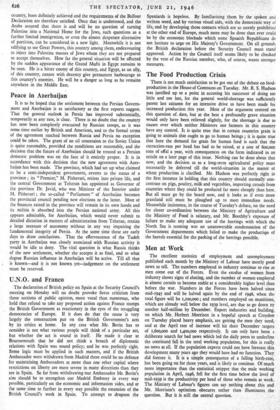U.N.O. and Franco
The declaration of British policy on Spain at the Security Council's meeting on Monday will no doubt provoke fierce criticism from those sections of public opinion, more vocal than numerous, who hold that refusal to take any proposed action against Franco stamps the British Government as reactionary in the eyes of the struggling democracies of Europe. If it does do that the cause is very largely the construction put on the British Government's acts by its critics at home. In any case what Mr. Bevin has to consider is not what various people will think of a particular act, but whether the act is sound in itself. He made it clear at Bournemouth that he did not think a breach of diplomatic relations with Spain was sound policy; and he was perfectly right. Some logic must be applied in such matters, and if the British Ambassador were withdrawn from Madrid there could be no defence for maintaining Ambassadors at more than one other capital where restrictions on liberty are more severe in many directions than they are in Spain. So far from withdrawing our Ambassador Mr. Bevin's aim should be to strengthen our Madrid Embassy in every way possible, particularly on the economic and information sides, and at the same time to further in every way possible the extension of the British Council's work in Spain. To attempt to dragoon the Spaniards is hopeless. By familiarising them by the spoken and written word, and by various visual aids, with the democratic way of life, and by developing those contacts which are so sternly prohibited at the other end of Europe, much more may be done than ever could be by the economic blockade which some Spanish Republicans do not hesitate to urge on His Majesty's Government. On all grounds the British declaration before the Security Council must stand approved. Action by the Council itself seems likely to be checked by the veto of the Russian member, who, of course, wants stronger measures.


























 Previous page
Previous page